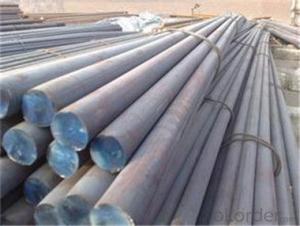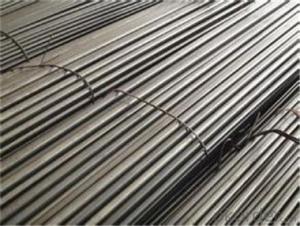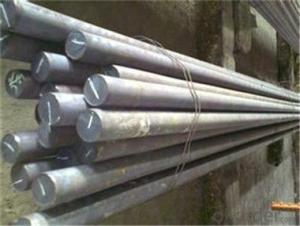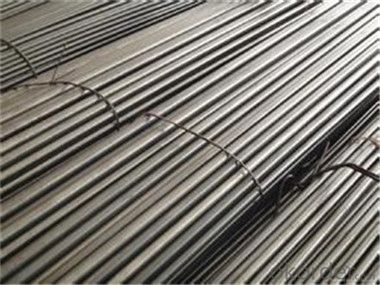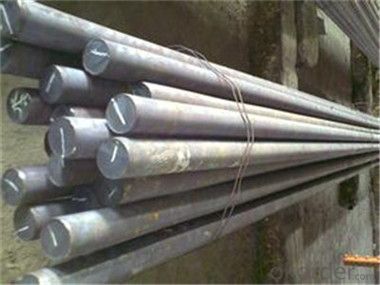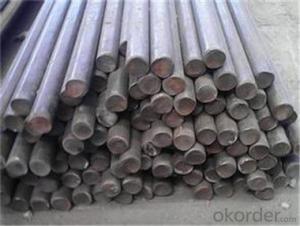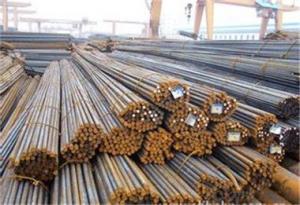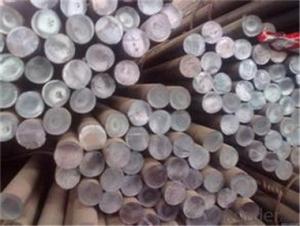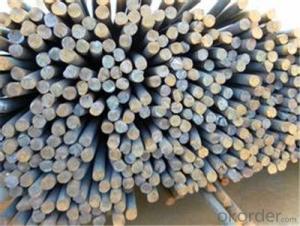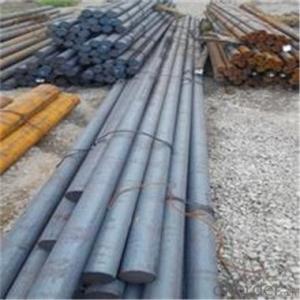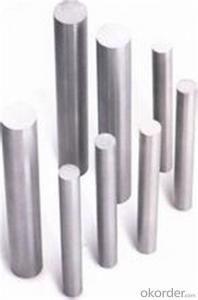Steel Round Bars Manufacturer with Standard High Quality
- Loading Port:
- Tianjin
- Payment Terms:
- TT OR LC
- Min Order Qty:
- 32 m.t.
- Supply Capability:
- 2000000 m.t./month
OKorder Service Pledge
OKorder Financial Service
You Might Also Like
Description of steel round bar:
Diamater:Ø12mm-Ø650mm
Length: standard 6m,9m,12m, If you need special lengths,please tell us.
Festures of steel round bar:
High hardness, wear resistance, good toughness, high resistance against compression load and impact, good dimensional stability during heat treatment and good machinability.
Specifications of steel round bar:
Description | steel round bar | |
Material | ASTM /AISI | 1005,1006,1008,1010,1015,1020,1025,1030,1035, 1040,1045,1050,1055,1060,1065,1070,1080,1084 |
DIN | Ck10,Ck15,Ck22,Ck25,Ck30,Ck35,Ck40,Ck45,Ck50, 30Mn4,40Mn4,1.7225,1.7220,1.7218,1.7016,1.6523 | |
Standard | GB/T799,ASTM A29,A36,A108,A321,A575,BS970,DIN1652,JIS G4051 | |
cross section | Round Other shape:square,hexagonal,flat,angle,rectangular | |
Surface | Black, galvanized,grinded,varnished,bare | |
Specifications | Round bar | Diameter: 12mm~650mm |
Angle bar | Size: 3mm*20mm*20mm~12mm*800mm*800mm | |
Square/ bar | Size: 4mm*4mm~100mm*100mm | |
Flat bar | Thickness: 2mm~100mm | |
Width:10mm~500mm | ||
Hexagonal | Size: 4mm~800mm | |
Length | Standard 6m,9m,12m or as required. | |
Trade terms | Payment terms | T/T,L/C,Western Union,negotiable etc. |
Price terms | FOB,CIF,CFR,EXW etc. | |
Applications | Steel round bar is widely used for all general fabrication and repairs in industrial maintenance, agricultural implements, transportation equipment, ornamental work frame work, braces, supports, shafts,axels,etc. Hot rolled Steel round bars have a slightly grain textured finish. | |
Images of steel round bar:
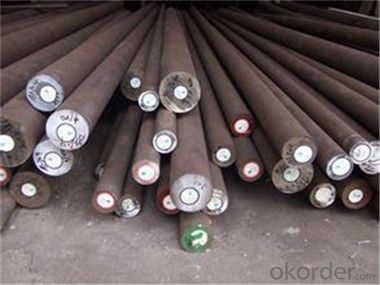
FAQ:
1. What is your package?
Packing situation: standard seaworthy packing or as customer required.
2. How long is the lead time?
Delivery time: 45 days after order confirmed.
3. What payment term do you accept?
Payment: T/T or L/C at sight.
- Q: Can steel round bars be used in the manufacturing of springs?
- Yes, steel round bars can be used in the manufacturing of springs. Steel round bars are commonly used as a raw material in spring manufacturing due to their high strength and durability. They can be formed, heat-treated, and shaped into various types of springs, such as compression springs, tension springs, and torsion springs, depending on the specific application requirements.
- Q: Are steel round bars suitable for plumbing applications?
- Yes, steel round bars can be suitable for plumbing applications. Steel is a durable and strong material, making it ideal for plumbing systems that require high pressure and load-bearing capabilities. Steel round bars can be used for various plumbing components such as pipes, fittings, valves, and supports. They are commonly used in applications where corrosion resistance and longevity are important, such as in water supply systems, underground piping, and industrial plumbing. However, it is important to consider the specific requirements of the plumbing application, including factors like water quality, temperature, and compatibility with other materials. Additionally, proper installation and maintenance are crucial to ensure the effectiveness and longevity of steel round bars in plumbing systems.
- Q: Can steel round bars be used for making jewelry?
- While gold and silver are commonly used for jewelry making, steel round bars can also be utilized in this craft. Steel round bars are particularly favored in industrial or modern jewelry designs due to their sleek and contemporary appearance. Moreover, steel possesses remarkable durability, resistance to tarnish, and affordability compared to other metals, making it an attractive option for those seeking a more economical choice. Nonetheless, it is worth noting that steel may not be suitable for delicate or intricate jewelry designs as it tends to be heavier than alternative metals. Furthermore, individuals with metal allergies should exercise caution as steel can potentially cause skin reactions. In such cases, it is advisable to opt for hypoallergenic or coated steel to ensure safety. Ultimately, the decision to incorporate steel round bars into jewelry making is contingent upon the desired style, durability, and budget preferences of the creator or purchaser.
- Q: How do you calculate the bending stress in a steel round bar?
- The bending stress in a steel round bar can be calculated using the formula: Bending Stress = (Moment * Radius) / (Section Modulus). The moment is calculated by multiplying the applied force by the distance from the force to the center of the bar. The radius is the radius of the round bar, and the section modulus is a property of the bar's cross-sectional shape that indicates its resistance to bending.
- Q: What are the properties of steel round bars?
- Steel round bars have several properties that make them a popular choice in various industries. Firstly, steel round bars are known for their strength and durability. Steel is one of the strongest materials available, and this strength is retained in the round bar form. This makes steel round bars ideal for applications where high strength and toughness are required, such as in construction, manufacturing, and engineering. Secondly, steel round bars have excellent machinability. They can be easily cut, drilled, and shaped, making them versatile for use in different projects. This property allows for easy fabrication and customization of the round bars to meet specific requirements. Furthermore, steel round bars have good corrosion resistance. They are often made from stainless steel or alloyed steel, which increases their resistance to rust and other forms of corrosion. This makes them suitable for use in outdoor and harsh environments, where exposure to moisture and chemicals can cause damage to other materials. Another important property of steel round bars is their high thermal and electrical conductivity. This makes them suitable for applications where heat or electricity needs to be conducted efficiently, such as in electrical systems or heat exchangers. Additionally, steel round bars have a smooth and polished surface finish. This not only enhances their aesthetics but also improves their resistance to wear and tear. The smooth surface reduces friction and allows for easy movement or rotation, making steel round bars suitable for use in mechanical components and machinery. Lastly, steel round bars are available in a wide range of sizes, grades, and finishes. This allows for flexibility in application and ensures that the right round bar can be selected based on specific requirements. Overall, the properties of steel round bars, including their strength, machinability, corrosion resistance, thermal and electrical conductivity, surface finish, and availability in various sizes and grades, make them a versatile and reliable choice for many industrial applications.
- Q: Can steel round bars be used in the manufacturing of conveyor systems?
- Yes, steel round bars can be used in the manufacturing of conveyor systems. Steel round bars are often used as the main structural component for conveyor systems due to their durability, strength, and ability to withstand heavy loads. They provide stability and support for the conveyor belt, rollers, and other components, making them an ideal choice for conveyor system construction.
- Q: Are steel round bars suitable for electrical conductivity?
- Steel round bars are not typically known for their electrical conductivity. Steel is a good conductor of heat but has relatively poor electrical conductivity compared to other metals such as copper or aluminum. This is because steel is primarily composed of iron, which is a poor conductor of electricity. However, the electrical conductivity of steel can be improved by adding certain alloying elements such as chromium or nickel. These alloying elements can enhance the electrical conductivity of steel, making it more suitable for specific applications where electrical conductivity is required. Nonetheless, if high electrical conductivity is a critical requirement, other materials like copper or aluminum are usually preferred over steel round bars.
- Q: Can steel round bars be used in the manufacturing of kitchenware?
- Yes, steel round bars can be used in the manufacturing of kitchenware. Steel is a durable and versatile material that is commonly used in the production of kitchen utensils and cookware. Steel round bars can be shaped and molded into various kitchenware items such as pots, pans, knives, spoons, and forks. The strength and heat resistance of steel make it suitable for cooking and food preparation purposes. Additionally, steel is easy to clean, hygienic, and resistant to corrosion, making it ideal for use in kitchenware.
- Q: What is the tensile strength of steel round bars?
- The tensile strength of steel round bars can vary depending on the specific grade and composition of the steel. However, on average, steel round bars typically have a tensile strength ranging from 400 to 700 megapascals (MPa).
- Q: What are the different types of steel round bar surface finishes for improved lubricity?
- There are several different types of steel round bar surface finishes that can be used to improve lubricity. 1. Smooth Finish: This is the most basic type of finish, where the surface of the round bar is made smooth through processes like grinding or polishing. A smooth finish helps to reduce friction and provides a good base for applying lubricants. 2. Chrome Plating: Chrome plating involves electroplating a layer of chromium onto the surface of the round bar. This creates a hard, smooth, and corrosion-resistant surface that provides excellent lubricity. Chrome plating is commonly used in applications where low friction and wear resistance are required. 3. Nitriding: Nitriding is a surface hardening process that involves diffusing nitrogen into the surface of the round bar. This creates a hard layer that enhances the lubricity of the steel. Nitriding is often used in applications where high wear resistance and improved lubrication are important. 4. Black Oxide: Black oxide is a chemical conversion coating that forms a black surface on the steel round bar. This finish provides a thin layer of protection against corrosion and also improves lubricity. Black oxide is commonly used in applications where lubricity is essential but a decorative appearance is not required. 5. Teflon Coating: Teflon coating, also known as PTFE (polytetrafluoroethylene) coating, involves applying a thin layer of Teflon onto the surface of the round bar. This coating provides excellent lubricity and low friction properties. Teflon coating is often used in applications where non-stick properties are required, such as in food processing or packaging industries. These are just a few examples of the different types of steel round bar surface finishes that can be used to improve lubricity. The choice of finish depends on the specific application requirements and the desired level of lubrication and wear resistance.
Send your message to us
Steel Round Bars Manufacturer with Standard High Quality
- Loading Port:
- Tianjin
- Payment Terms:
- TT OR LC
- Min Order Qty:
- 32 m.t.
- Supply Capability:
- 2000000 m.t./month
OKorder Service Pledge
OKorder Financial Service
Similar products
Hot products
Hot Searches
Related keywords
